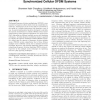987 search results - page 89 / 198 » Attack-resilient time synchronization for wireless sensor ne... |
GLOBECOM
2010
IEEE
14 years 8 months ago
2010
IEEE
In a traditional wakeup scheduling, sensor nodes start up numerous times to communicate in a period, thus consuming extra energy due to state transitions (e.g. from the sleep state...
IWCMC
2006
ACM
15 years 3 months ago
2006
ACM
Orthogonal frequency division multiplexing (OFDM) is very sensitive to frequency offsets which result in considerable interference. Performance of the system will be exacerbated ...
TII
2008
14 years 9 months ago
2008
In wireless sensor networks each sensor node has very limited resources, and it is very difficult to find and collect them. For this reason, updating or adding programs in sensor n...
DSN
2004
IEEE
2004
IEEE
Evaluating the Impact of Limited Resource on the Performance of Flooding in Wireless Sensor Networks
15 years 1 months ago
Abstract-- Wireless sensor networks (WSNs) are large collections of resource limited nodes, densely deployed over a landscape. They gather and disseminate local data using multihop...
83
Voted
DIALM
2008
ACM
14 years 11 months ago
2008
ACM
We consider the Maximum Integral Flow with Energy Constraints problem: given a directed graph G = (V, E) with edge-weights {w(e) : e E} and node battery capacities {b(v) : v V }...

